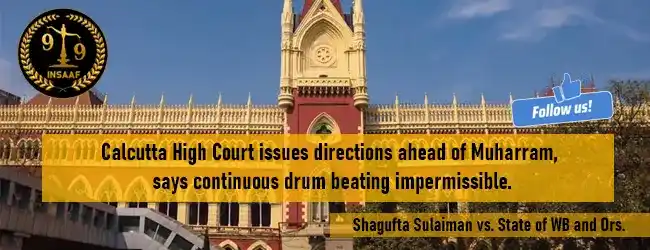2023-Nov-17

The Petitioner filed a public Interest Writ Petition before the Calcutta High Court against severe noise pollution in various parts of the city on account of continuous beating of drums by a group of persons, throughout the day and night on the alleged ground that they were performing the mourning ritual on occasion of Muharram. According to the petitioner, the noise pollution is a serious threat to public health and welfare. It creates stress and would affect the persons, who reside in and around the area, where this beating of drums is being done throughout the day and night.
The High Court referred to the decision of the Hon’ble Supreme Court in the case of Church of God (Full Gospel) in India vs. KKR Majestic Colony Welfare Association & Ors. reported in A.I.R. 2000 SC 2773 where the issue of noise pollution on the ground of religion was discussed observed that:
The High Court observed thus:
The Hon’ble Supreme Court also took note of the articles, which appeared in the ICMR bulletin of July, 1979 containing a study on noise pollution in South India, wherein it is pointed out that noise pollution will lead to serious nervous disorders, emotional tension leading to high blood pressure, cardiovascular disease, increase in cholesterol level resulting in heart attacks and strokes and even damage to foetus. In the said case, the appellant was a Church and the allegation was on account of use of loudspeakers, there was a nuisance caused on account of noise pollution. The Hon’ble Supreme Court pointed out that it cannot be said that the religious teachers or the spiritual leaders, who had laid down the tenets had in any way desired the use of microphones as a means of performance of religion. Further, it was pointed out that one can practice, profess and propagate religion, as guaranteed under Article 25(1) of the Constitution but that is not an absolute right. The provision of Article 25 is subject to the provisions of Article 19(1)(a) of the Constitution and on a true and proper construction of the provisions of Article 25(1) and Article 19(1)(a) of the Constitution, it cannot be said that the citizens should be coerced to hear anything, which he does not like or which he does not require.
The Court while disposing of the Writ Petition passed directions to the West Bengal Pollution Control Board to immediately issue a public notice giving wide publicity that the noise level cannot exceed the permissible decibel, as laid down under the relevant rules and notifications and also make it clear that any violation thereof would invite penal action under the provisions of the pollution control laws
What can the Legal Experts do for you? Our team of lawyers is ready to help you in minutes with any legal question.
 Whatsapp
Whatsapp
 Toll Free :-
1800-212-9001
Toll Free :-
1800-212-9001